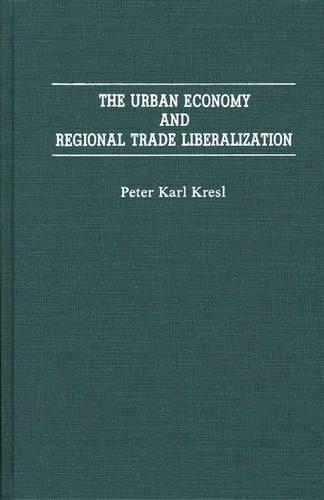
The Urban Economy and Regional Trade Liberalization
(Hardback)
Publishing Details
The Urban Economy and Regional Trade Liberalization
By (Author) Peter Kresl
Bloomsbury Publishing PLC
Praeger Publishers Inc
16th June 1992
United States
Classifications
Tertiary Education
Non Fiction
382
Physical Properties
Hardback
224
Description
This book explores the role of cities in the trade liberalisation process of the global economy and their efforts to enhance the "competitiveness of cities". Cities have become the primary actors in the trade liberalisation process, both in North America and Europe. It is their efforts to design strategic responses, to create city networks, to influence priorities for public expenditures, and to enhance their own competitiveness that are vital to the realisation of the potential for increased efficiency and higher incomes which free-trade promises. This work examines the impact of trade liberalisation on the urban economy through case studies of urban areas along the US-Canadian border, in the European Community, and in Scandinavia. The findings may be of interest to scholars in development economics and international trade and to practitioners and policy-makers involved in urban economic development.
Reviews
Kresl's central thesis is that urban centers play an important, if not determinant role, in the realization of any benefits projected to flow from a regional trade liberalization scheme. In essence this is an area-specific examination of welfare economics applied to trade liberalization. Using the Canada-US trade agreement and the announced policy of the EC to complete economic integration by the end of 1992, the author attempts to demonstrate the critical role that urban centers can play in either frustrating or facilitating the resulting changes in the economic structure of a given nation or set of national economies. In addition to a careful review of the literature as well as a detailed review of the North American and European schemes and their predicted effects, Kresl marshals information gathered in interviews with urban leaders in both Europe and North America together with a detailed European case study to support the central thesis. Extensive bibliography; chapter notes. This is a rather fulsome treatment of a highly targeted question that lies in the intersect of trade and welfare economics theory. Advanced undergraduate; graduate.-Choice
"Kresl's central thesis is that urban centers play an important, if not determinant role, in the realization of any benefits projected to flow from a regional trade liberalization scheme. In essence this is an area-specific examination of welfare economics applied to trade liberalization. Using the Canada-US trade agreement and the announced policy of the EC to complete economic integration by the end of 1992, the author attempts to demonstrate the critical role that urban centers can play in either frustrating or facilitating the resulting changes in the economic structure of a given nation or set of national economies. In addition to a careful review of the literature as well as a detailed review of the North American and European schemes and their predicted effects, Kresl marshals information gathered in interviews with urban leaders in both Europe and North America together with a detailed European case study to support the central thesis. Extensive bibliography; chapter notes. This is a rather fulsome treatment of a highly targeted question that lies in the intersect of trade and welfare economics theory. Advanced undergraduate; graduate."-Choice
Author Bio
PETER KARL KRESL is Associate Professor of Economics at Bucknell University. He has been a visiting scholar at the University of Vermont, the Norwegian School of Economics, the University of Lund, and Carleton University, and has served as president of the Association for Canadian Studies in the United States.
